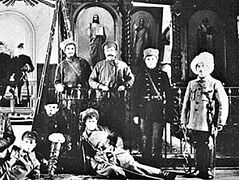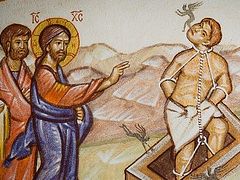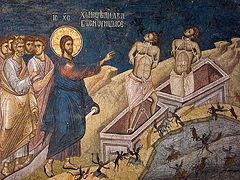In the name of the Father, the Son, and the Holy Spirit!
Today we heard in the Gospel according to Luke the story of how Christ came with His disciples to the land of the Gadarenes. There He met a man who had been possessed by demons. They had bound him in chains but he broke those chains, and ran driven on by the demons to the desert, no longer living in the city but in the graves, in the caves outside the city.
A dialogue ensued between them; that is, the Lord spoke with those devils who had taken that man captive and possessed him, and He commanded that they go out of the poor sufferer. The devils fled into the herd of swine that were feeding nearby, and possessed by those demons, it rushed into the Sea of Galilee and drowned. But the unfortunate man was healed and sat at Jesus’s feet. He didn’t want to leave Him. The swineherds who witnessed this scene went to the city and told the Gadarenes about the miraculous healing and the death of the swine. The Gadarenes came to Christ, were convinced of what had happened, saw the man whom everyone knew that he was incurably ill, a demoniac, and they were afraid—that is what the evangelist Luke says. They were afraid at what had happened, and they asked Christ to leave their city. The healed man wanted to stay with Christ, but He commanded him to go and preach about what had happened to him.
In this story, we see the story of our lives. People are very often afraid, horrified. In general we live in constant fear—for our health, for our children, for our future, for our country. We are afraid of various things—such is the fate of man, cast out of Paradise. He is often in fear of various dangers.
But there are also very many people who are afraid of their own salvation, afraid of Christ. They do not want to hear about Him. Moreover, these people, by all external appearances, live quite decently in the sense that they are not sick people at first glance. But in fact, they are held captive by their cares, passions, and the manner of life they are used to living. And when you start talking with them about Christ, about Truth, salvation, or the commandments, they often get irritated, they interrupt you and don’t want to hear it. It is painful for them to hear it; they get afraid, because they are so accustomed to their lives that they don’t need the Truth, they don’t need salvation. They are complacent about their normal lives.
They are afraid of much more: of competition, their enemies, afraid for their money, for their careers, their power—but most of all they are afraid that Christ the Savior of the world will come into their lives and their lives will change. They are afraid as were those Gadarenes—it was not important to them that Christ had worked such a miracle, the healing of a sick man whom nothing else could help. To them it was important that their lives remain what they always were before.
This is the true horror of our lives. We are afraid of Christ because, in order to become His disciples, we have to lose something in this world. And the devil has us all caught on the same hook—our ambitions, our pride, our fear of losing something in order to gain Christ. Truly, in order to be Christ’s disciples we have to give up something in this world, and we don’t want to. We want to be saved and at the same time serve this world—this is the strange and unbelievable thing that happens with us.
The apostle says today that our world is Christ, that Christ is everything for us, the meaning of our lives. He is the closest One to us—He is everything for us. And therefore we are co-citizens of the saints and venerable ones. We are close to them by means of our closeness to Christ.
But the world does not want this, and we are also afraid. We are afraid of this and say to Christ, “Everything You say is true, but pass me by, pass me by! We even believe in You, we love You, but closeness to You is too dangerous for our lives, and we are afraid of losing our habits, our power, our money…”
That is why so many people are wealthy but incapable of loving anyone. Lavish wealth and love are two incompatible things. They can’t love anyone because they cannot love Christ. They are incapable of losing something temporary in order to acquire what is eternal.
I would like to wish for all of us that we would be horrified first and foremost at our own lives, at our own sins; and that we would rejoice when Christ comes into our home, into our hearts, and leads us along the wonderful path to the Kingdom of Heaven. Amen.





